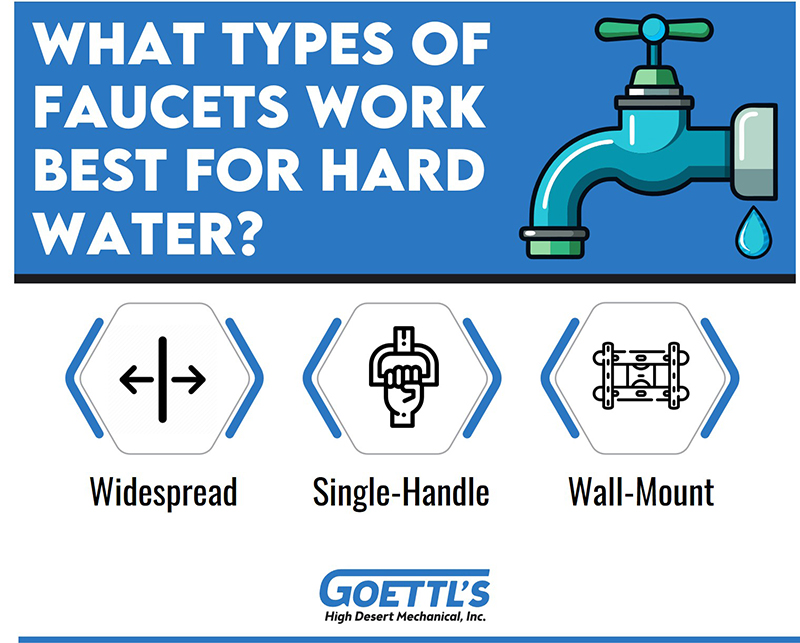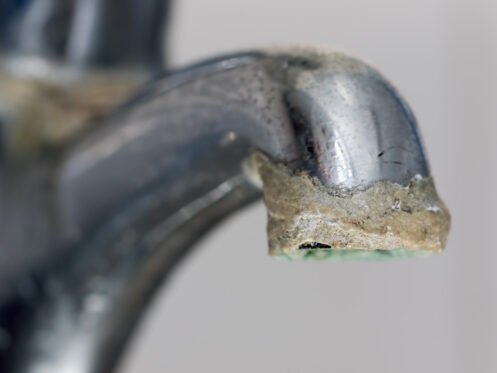Choosing the correct faucets for hard water requires special consideration. Water with high mineral content can wreak havoc on unsuitable fixtures, leaving behind unsightly residue and resulting in extensive damage. Fortunately, there are several ways to choose high-performance faucets that are practical, functional, and aesthetically pleasing.
A look at the top factors involved in picking the best faucets for water hardness can help you make the most advantageous decision for your household.
What Is Hard Water?
Hard water refers to the concentration of dissolved minerals in water. The most common chemicals associated with hard water are calcium and magnesium ions. Calcium and magnesium carbonates occur naturally in Earth’s crust. When local water percolates through the earth’s limestone, chalk, and gypsum, the water carries away mineral deposits that eventually make it to neighborhoods and municipalities. Scientists measure water hardness in either parts per million (PPM) or grains per gallon (GPG). According to the Department of Energy, most local governments label water “hard” if it has an ionic concentration of over 60 PPM or 3.50 GPG.
What Are the Effects of Hard Water?

Scale Buildup
As hard water heats up or evaporates, it can leave behind mineral buildup known as scale. This buildup can accumulate in pipes, faucet openings, and fixtures. The buildup restricts waterflow and water pressure. It can also create clumps, clogs, or blockages that create wastewater backflow. As the buildup oxidizes, it can also create corrosion that leads to pipe or fixture cracks. Because harsh commercial drain cleaners can further weaken pipes and cause them to burst, you should avoid attempts to remove extensive buildup yourself. Instead, contact a trained plumber who has the equipment necessary to inspect pipes and remove limescale.
In addition, scale buildup can also lower the energy efficiency of water-hating appliances. Hard water scale can even tarnish the exterior finish of a faucet, compromising the aesthetic appeal of your room’s fixtures. Choosing the right faucet can minimize the effect that hard water scale has on your room design.
Soap Scum
The minerals in hard water can react with soap or detergent molecules to create a filmy residue known as soap scum. Not only can this substance leave a sticky residue on hands and dishware, but it can also create a dull buildup on faucets. Because soap scum is often insoluble, it can create a permanent ring around a fixture that requires expert help for removal.
Appliance Damage
Mineral deposits can flow from pipes and faucets directly into major appliances like washing machines, water heaters, and dishwashers. Scale buildup can also impact everyday appliances like coffeemakers. The presence of scale can force appliances to work harder during operation, thereby reducing energy efficiency and shortening equipment lifespan. This can also lead to higher utility bills, increased repairs, and potential replacement costs.
What Features Should I Consider for a Faucet for Hard Water?
While faucets for hard water vary in design, there are standard features you should consider when making a decision. These features include water pressure and flow rate, corrosion resistance, and faucet functionality.
Water Flow Rate
If you live in an area with hard water, most experts recommend choosing a faucet with a lower water flow rate. A lower rate of water flowing from the faucet can reduce the amount of mineral buildup over time.
Water Pressure
Water pressure is the force at which water leaves your pipes and faucet. Scientists measure water pressure in pounds per square inch (PSI). Residential water pressure ranges from roughly 40-80 PSI. If you already have hard water, experts recommend water pressure of at least 60 PSI to counteract the risk of buildup.
Corrosion Resistance
Faucets made of corrosion-resistant materials can withstand the impact of hard water. These materials also resist the accumulation of scum, dirt, and debris that can reduce the aesthetic appeal of kitchens or bathrooms.
Functionality
Functionality is one of the most important aspects of a good faucet. This aspect consists of all technical components like cartridges, nozzles, and filters. For example, a faucet should have a high-quality cartridge or valve that enables smooth operation and reduces the chances of leaks. You can also consider faucets with rubberized or silicone nozzles that help prevent mineral clogging. Additional features may include faucets with optional spray and stream functions. Faucets with these water-saving options can reduce the amount of hard water that flows through your fixture each year.
What Types of Faucets Work Best for Hard Water?
In addition to general features, there are specific design models that work best for homes with hard water. These types include widespread faucets, single-handle faucets, or wall-mount faucets.
Widespread Faucet
Widespread faucets feature separate hot and cold handles as well as an independent spout. This design makes hard water less likely to pool into a single faucet body and leave thick deposits over time.
Single-Handle Faucet
Single-handle faucets tend to be simpler to clean since these fixtures have fewer crevices or joints in which scale can accumulate. You will still need to select one with a recommended flow rate that reduces the risk of mineral buildup over time.
Wall-Mount Faucet
As the name implies, a wall-mount faucet is connected directly to an adjacent wall and flows directly into the sink instead of the faucet body itself. This modern design clears space on the countertop and minimizes the risk of mineral deposits and hard water stains. Since these faucets often connect to the main wall pipeline, a plumber may help you install one to avoid complications.
What Finishes Work Best for Hard Water?
The right faucet finish is a “secret weapon” against mineral deposits and corrosion. Since hard water consists of a high concentration of mineral ions, the metals in some faucet materials can react with these carbonates and increase buildup. To protect your fixture, there are several types of recommended finishes that lower the risk of stains, tarnishing, or debris accumulation.
Chrome Finish
Chrome has a non-porous surface that makes it ideal for areas with hard water. It is resistant to rust, corrosion, and tarnishing. Chrome is also a modern application that is popular in updated kitchens as well as bathrooms and laundry rooms.
Bronze Finish
Bronze is popular due to its warm and sophisticated tone. This finish is suitable for traditional-style homes and can also match rustic designs. Bronze is resistant to scratching and mineral buildup.
Nickel Finish
Nickel is one of the most elegant varieties of faucet fixtures. It is also among the most durable. Regular cleaning, maintenance, and polishing from a professional can help conserve the luster of this finish. Known for its timeless and inviting appearance, nickel is also resistant to corrosion and tarnishing.
Brass Finish
Brass and zinc alloys are long-lasting materials that do not stain, rust, dent, or corrode. For this reason, this type of finish is popular for everything from musical instruments to bathroom fixtures. With proper maintenance, brass-finish fixtures undergo decades of regular use while remaining resistant to wear and tear.
Matte Black Finish
Matte finishes provide an extra layer of protection against moisture and corrosion. Choosing matte black is a viable option for preventing rust and the appearance of stains. Also known as a physical-vapor deposition finish, matte can offer a defense of buildup that occurs when minerals react with acidity of tap water in regions with extreme levels of water hardness.
Pewter Finish
Pewter is a tin alloy. Also known as an antique finish, pewter finish has a weathered appearance and offers additional protection from corrosion. It has a timeless look that makes it durable for various design schemes.
Enamel Finish
Enamel finish is a sleek, protective coating that has been popular in bathrooms for decades. Artisans create enamel by placing a sheet powdered glass onto a metal surface and then heating it to produce a glossy finish. Enamel is resistant to scratches and any form of metal corrosion, making it suitable for areas with hard water.
Contact Us Today
The right faucets can help minimize the effect that hard water has on everyday life. But if you are still struggling with water hardness, it is best to contact the experts for help. Goettl's High Desert Mechanical provides plumbing solutions for homes in Camp Verde, AZ and surrounding areas. We can install water softeners and can also also conduct hydro jetting to remove clogs that have resulted from building. Our experts can also perform re-piping for major plumbing issues and can complete faucet repairs. We can also fix garbage disposals and water heaters.
Contact Goettl's High Desert Mechanical today for all plumbing needs.
